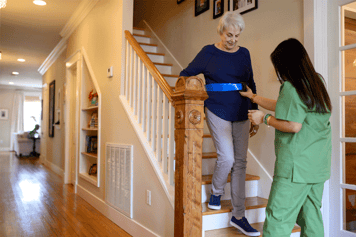If you or a loved one is facing an end-of-life journey with a Stage 4 cancer diagnosis, you may wonder what to expect. It can be comforting to learn what is typical during the final weeks of life with cancer, how to best manage cancer pain and the most helpful ways to approach emotional and psychological support. In this article, we will address these questions and discuss how hospice can support you during this difficult time.
Stage 4 Cancer: The Basics
Stage 4 cancer, or metastatic cancer, is the most advanced form of cancer, where it has spread from its original location in the body to other organs. The mortality rates for this stage of cancer vary widely depending on the type of cancer diagnosed.

When Stage 4 cancer progresses and treatment is no longer working to stop the cancer from worsening, it can feel scary. During this stage people often face challenging symptoms. Even when treatments can no longer slow the disease, care is still available to ease these symptoms, provide comfort and support the best possible quality of life.
Signs of Advanced Cancer at the End of Life
Oncologists help people who are diagnosed with Stage 4 cancer plan the best treatment options to prolong life and hopefully achieve remission, meaning the cancer signs and symptoms have been reduced or eliminated. 1
When remission is not possible, the signs and symptoms of Stage 4 cancer progressively worsen, and your physician may tell you that treatment is no longer working.
Hospice care may be elected when a patient decides to stop cancer treatment and a physician certifies that they likely have six months or less left to live if the disease runs its normal course. Hospice is fully covered by Medicare. The focus of hospice care is on comfort and quality of life for patients with a terminal illness.
Common signs and symptoms that can happen in Stage 4 cancer include:
- Increased pain
- Fatigue
- Shortness of breath
- Decreased appetite
- Progressive muscle and/or weight loss
- Weakness
- Frequent falls
Symptoms also depend on the type of cancer diagnosed. For example, signs of advanced, terminal esophageal cancer can include increased difficulty swallowing, severe chest pain, progressive weight loss and trouble breathing along with worsening pain.
The Three Stages of Dying in Stage 4 Cancer
As a person progresses through the stages of dying, there are changes in responsiveness and body function. There are three stages usually described, called early, middle and late:
- Early stage— the person may eat less, lose weight and notice increased pain and nausea. They may become more withdrawn and sleep more.
- Middle stage— lasting from a few hours to several days, the person may be less responsive, show increased restlessness and confusion or struggle to speak or move.
- Late stage— signs of the final days or hours include disorientation, confusion, lack of responsiveness, loss of control of bodily functions and shallow and/or irregular breathing.
How Hospice Care Helps with Stage 4 Cancer
According to the National Alliance for Care at Home, 24% of those receiving hospice have a cancer diagnosis. 2 Although hospice care is available when a doctor certifies a patient has six months or less left to live if the cancer runs its normal course, as many as 50% of patients are only enrolled in hospice care for 17 days before they pass away. 3

In a Kaiser Family Foundation survey, 7 out of 10 Americans say they would prefer to spend their final days at home.4 But cancer pain and other symptoms can mean more visits to the hospital for those at the end of life. Hospice care is provided wherever the person calls home and can help with symptom management and medical care for eligible patients with Stage 4 cancer, helping to ensure that a person’s wishes for their final days are honored.
Cancer Pain Treatment in End-of-Life Care
Because cancer pain often worsens at the end of life, the hospice team works together with the patient and their family to identify the quality and severity of pain and offer pain management that improves comfort.
Treatment may include medications ranging from over-the-counter drugs to stronger prescription medications as determined to be appropriate by the physician and care team. Additionally, massage therapy, cold and/or heat applications and relaxation or meditation techniques may be used.
Emotional, Psychological and Spiritual Support
End-of-life pain is not just physical — it can also be emotional, psychological or spiritual. Hospice caregivers, including social workers and chaplains, offer guidance during this difficult time, supporting both patients and their families through the difficult emotions that can arise. This care extends beyond a patient’s end of life, with bereavement services available for families for up to 13 months after their loved one passes away.
24/7 Support From a Hospice Team
The hospice interdisciplinary team includes physicians, hospice nurses, trained volunteers, medical social workers, hospice aides, bereavement counselors and chaplains. Hospice team members schedule regular visits based on patient and caregiver needs and are on-call 24 hours a day, seven days a week, all year long. Their goal is to holistically support the patient in meeting their personalized goals of care for improved quality of life in their final journey.
Choosing a Hospice Provider for Stage 4 Cancer
Making the decision to contact a hospice provider can feel overwhelming. At Amedisys, our hospice specialists can help. We are available to answer any questions you may have about what hospice provides and whether you or your loved one is eligible for care. To learn more, you can take our hospice quiz or contact us today using the form below.
Deb Gallaher, MBA, MSN, RN, NE-BC, CHPN, is a Senior Hospice Clinical Education Specialist for Amedisys. She has 10 years of experience in hospice and is passionate about sharing her insights on high-quality care.





